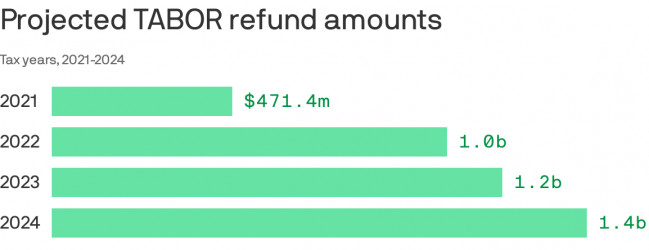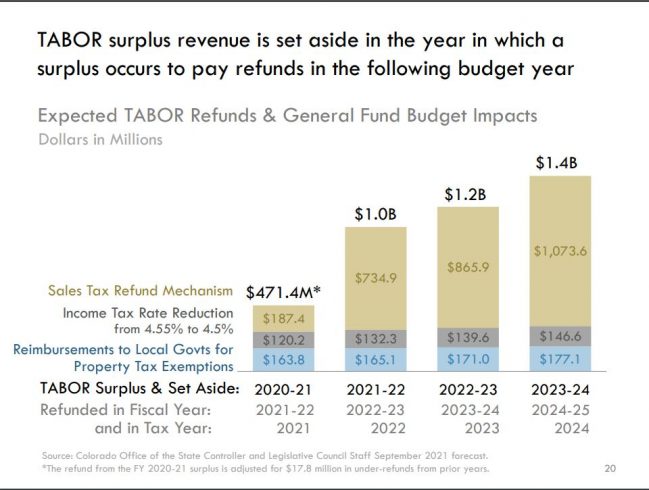#ItsYourMoneyNotTheirs
#ThankGodForTABOR
#VoteOnTaxesAndFees
#FeesAreTaxes
#TABOR
#FollowTheMoney
#FollowTheLaw

#ItsYourMoneyNotTheirs
#ThankGodForTABOR
#VoteOnTaxesAndFees
#FeesAreTaxes
#TABOR
#FollowTheMoney
#FollowTheLaw

By Natalie Menten
Guest Commentary
The state government has taken more taxes from you than we allow it to have, and it should rebate that over-collection back to you. That money coming back to all taxpayers is now in jeopardy. We should be alarmed at the potential waste.
Colorado voters’ dissatisfaction with government growing beyond its means led to the passage of the Taxpayer’s Bill of Rights (TABOR). This constitutional amendment requires voter approval for tax increases and debt. It also limits how fast government can grow. The formula for automatic tax increases is the prior year’s budget plus adjustment for inflation and population growth.
When government collects taxes above the limit, it must refund the surplus. Later this year, each taxpayer will get a $750 TABOR rebate from the state. The economic outlook predicts rebates for the next several years.
Two statewide ballot measures in November claim they don’t raise taxes, but that’s just not true. Funding for new programs comes from our future TABOR rebates. If we don’t get all those rebates back, that’s effectively a higher tax rate and clearly a tax hike.
Click the link below to continue reading this article at the Denver Post.
Opinion: Statewide affordable housing program will cut into your TABOR refunds
Jefferson County is one of more than a dozen counties in Colorado that still enjoys the protections of the Taxpayer’s Bill of Rights (TABOR). This constitutional amendment requires voter approval for tax increases and debt. It also modestly limits how fast government can grow. The formula for automatic tax increases is the prior year’s budget plus adjustment for inflation and local growth.
Jefferson County government is presently allowed to grow 3.9% annually under the formula as described in a Board of County Commissioners agenda for July 19 (page 171). That’s a reasonable amount for government growth – compare it to your household. Have you gotten nearly a 4% increase in your income?
Yet, the county commissioners have spent the last few years claiming they have insufficient revenue to maintain operations. Now they blame the revenue problem on the pandemic, yet the county received close to a couple hundred million in COVID relief money.
That pile of federal money still didn’t calm down the county commissioners’ quest to get rid of our Taxpayer’s Bill of Rights.
To continue reading the rest of this story, please click (HERE) to go to Complete Colorado
#ItsYourMoneyNotTheirs
#ThankGodForTABOR
#VoteOnTaxesAndFees
#FeesAreTaxes
#TABOR
#FollowTheMoney
#FollowTheLaw

#ItsYourMoneyNotTheirs
#ThankGodForTABOR
#VoteOnTaxesAndFees
#FeesAreTaxes
#TABOR
#FollowTheMoney
#FollowTheLaw
#UnlessLiberalsIgnoreTheConstitution
The April 20th Title Board Hearing has a notable 60 proposals on the agenda because it’s the last chance to get title set for the 2022 ballot. Although the list of potential ballot issues is long, many are variations with a slight tweak. After title setting, the proponents must do the hard (or expensive) work of getting enough signatures.
Nearly a 1/3 of the proposals pertain to alcohol licensing, sales, and delivery.
Property taxes are another hot topic. Pro-taxpayer advocates are presenting relief in the form of a 2%-3% cap on property taxes.
Bigger government advocates propose a new tax on “Luxury Residential Real Property,” defined as $2 million or more. New revenues would be turned over to government to address affordable housing. On that same theme, there’s a proposal to increase the income tax rate which would be spent on government-overseen affordable housing.
Another group wants to increase taxes from income tax by reducing deductions, putting increased taxation towards free school lunches for certain public schools – an expenditure of $60 – $140 million dollars a year.
Protecting the Taxpayer’s Bill of Rights begins before a ballot issue hits the street. The public can testify at the title setting meeting to get transparent language about the financial effects. If you’ve been around Colorado long enough you know that proponents of tax increases will actually try to have the question read, “without raising taxes” if they can get away with it. As we know, if you end up with less money in your pocket because of a tax policy change, that’s a tax increase.
Currently, there’s a legal battle just filed with the Supreme Court over initiatives #62-65, called Additional Revenue to State Education Fund. Proponents are attempting to claim the measures are not a tax increase. Any of the four variations would reduce or completely eliminate our expected rebates from the Taxpayer’s Bill of Rights over the next two years. Since there is no sunset, we would give up a substantial amount of our future refunds if #62-65 moves forward.
You can find the ballot proposals at the Colorado Secretary of State website under Elections & Voting and Initiatives & Title Board. You’re looking for the section titled Awaiting Initial Hearing.
You can testify remotely. The meeting is Wednesday, April 20 starting at 9 am. https://attendee.gotowebinar.com/register/3996912106274902539
Email the Title Setting Board at initiatives@coloradosos.gov. Emails should be sent by Tuesday midday at the latest. Otherwise, listen in remotely and chime in when it’s time. It’s going to be a long meeting.
Natalie Menten
TABOR Board Member


EL Paso County voters will decide in November 2021 whether to refund $15 million in excess government revenue back to residents or to use the money to address road infrastructure projects and backlogged parks maintenance.
Courtesy of El Paso County Public Works
El Paso County voters will decide whether the county may keep $15 million in excess government revenues to fund road infrastructure and deferred parks maintenance projects when they cast their ballots Nov. 2 — money that would otherwise be refunded to taxpayers under Colorado’s Taxpayer’s Bill of Rights.
If voters approve the question, El Paso County will use $13 million of surplus funds to pay for backlogged roadway improvements, including paving and repairing potholes on roads throughout the county. Another $2 million would fund deferred parks projects such as capital improvements, trail preservation and wildfire mitigation at Bear Creek Park, Paint Mines Interpretive Park, Fountain Creek Regional Trail, Ute Pass Regional Trail, The Pineries Open Space and Fox Run Park, including a northern nature center.
The question also asks voters to decide whether to raise El Paso County’s revenue cap to reflect actual 2021 revenue, increasing the limit from $285 million to about $300 million. The amount of the final revenue cap is unknown until next May, because El Paso County will continue collecting additional state and sales tax revenues through the rest of the year, county spokeswoman Natalie Sosa previously said.
TABOR calculates increases in most local government revenues to a formula based on population growth and inflation. Excess can only be used for voter-approved purposes. Continue reading
Tails should not wag dogs. It defies physics, not to mention the will of the dog. Tails should wag dogs no more than politicians should decide the size and scope of a government established by the governed to serve the governed. A roaring economy should never increase the size and scope of government unless the people demand it.
The residents of Colorado have made clear they don’t want more government. They believe the state has all the money it needs. They reiterated this conviction just two years ago when they trounced Proposition CC, a proposal to let the state keep revenues above a floating state spending cap determined by an equation of inflation and population growth.
Just last year, voters went a step further and lowered the Property tax from 4.63% to 4.55%, and probably would have voted for a lower rate had they been given the option.
One reason this center-left blue state wants to throttle back government spending is the general discontent the public has with the way politicians treat their money.
To read the rest of this editorial, please click (HERE):

Source: Colorado Legislative Council; Chart: John Frank/Axios
Colorado is preparing to issue $4.1 billion in refunds to taxpayers over the next four years, new projections show.
State of play: Whether that’s a good thing remains up for debate among state lawmakers.
What’s happening: Democratic lawmakers and liberal advocates are renewing a push to bypass the Taxpayer’s Bill of Rights and keep the surplus tax revenue, saying the money is needed to help the state build back from the pandemic and improve education.
What they’re saying: “This coming year, taxpayers will see rebate checks, but those will come at the expense of better funding for public services that reduce costs for all of us,” state Sens. Chris Hansen and Dominick Moreno, both Democratic budget writers, wrote in a recent opinion piece.
The other side: Gov. Jared Polis, a Democrat, is cheering the refunds, saying they’re a sign of a good economy.
Conservative supporters of TABOR are blasting Democrats for wanting to keep the cash.
How it works: Under TABOR, the voter-approved constitutional amendment, Colorado’s tax revenues cannot exceed the rate of inflation plus population growth. When they do, the surplus must go back to taxpayers unless voters allow the government to spend the money.
The size of the surplus determines how it is refunded.
To read the rest of this story, please click (HERE):

Colorado taxpayers should expect to see Taxpayer’s Bill of Rights refunds for the next several years, provided state revenues continue to do well over that time, state economists told lawmakers Tuesday.
Those economists told the Colorado Legislature’s Joint Budget Committee that their third-quarter revenue forecasts are showing that if the economy continues to bounce back from last year’s pandemic downturn the way it is right now, the state could see more than $4 billion in surplus revenue over the next four years.
That’s money over and above what the 1992 TABOR and 2005 Referendum C voter-approved amendments allows the state to retain, meaning it all is to be refunded to taxpayers when they file their income tax forms starting next year.
That’s all possible because the state’s economy overall is at or near at pre-pandemic levels.
To continue reading this story, please click (HERE):